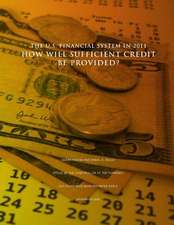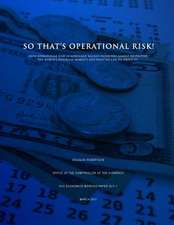Fannie Mae's and Freddie Mac's Financial Status
Autor N. Eric Weissen Limba Engleză Paperback
Preț: 99.12 lei
Nou
Puncte Express: 149
Preț estimativ în valută:
18.97€ • 19.80$ • 15.70£
18.97€ • 19.80$ • 15.70£
Carte disponibilă
Livrare economică 14-28 martie
Preluare comenzi: 021 569.72.76
Specificații
ISBN-13: 9781480151543
ISBN-10: 1480151548
Pagini: 30
Dimensiuni: 216 x 280 x 2 mm
Greutate: 0.1 kg
Editura: CREATESPACE
ISBN-10: 1480151548
Pagini: 30
Dimensiuni: 216 x 280 x 2 mm
Greutate: 0.1 kg
Editura: CREATESPACE

























